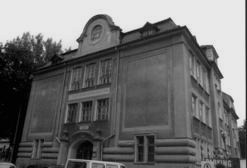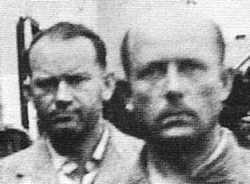 |
| Höfle |
Hermann Julius Höfle was born in
Salzburg on
19 June 1911. He joined the
NSDAP on
1 August 1933 with party number 307,469, having joined the
Austrian Nazi party three years earlier.
He was a trained mechanic who ran a taxi company in
Salzburg. Höfle joined
the SS.
Between late 1935 and January 1936 he was imprisoned in
Salzburg. A year later he was head of the
SS-Sturmbann 1/76, a SS-unit. The first action in which he took part was the
Reichskristallnacht. He
impressed
Adolf Eichmann and was recommended to
Globocnik.
After training at the officersí school in
Dachau, Höfle served briefly in the
Sudetenland prior to the outbreak of WW2. After the invasion of Poland he served in the
Selbstschutz in
Nowy Sacz in Southern Poland.
From
November 1940 he served as an overseer of Jewish work camps working on
frontier fortifications, a network of anti-tank ditches near
Belzec.
Höfle, along with a number of other key players in
Aktion Reinhard, was
also involved in the construction of SS and Police bases in the newly occupied eastern areas. During
1941 Höfle was in
Mogilev. Then he was sent back to
Lublin, where he was involved in the early planning of
Aktion Reinhard.
On
16 March 1942 he participated in a meeting of
Aktion Reinhard SS-men and members
of the German civil administration to discuss how to
organize the deportations to
Belzec.
 |
| Julius Schreck Barracks |
According to another member of the
Aktion Reinhard staff,
Georg Michalsen,
Höfle, as
Globocnikís Chief of Staff for
Aktion Reinhard, lived in
the Julius Schreck Barracks in
Lublin.
On the ground floor of this building was the transport squad. On the first floor was the administration, accounts,
and archive. Here the Chief of Staff also had a room and an ante-room. On the second floor was the
personnel department. Here Höfle had his living quarters in one room.
Höfle played a major role in deportation actions in
Mielec, Lublin,
Rzeszow, Warsaw and Bialystok, and also acted
as
Eichmannís escort when the latter
visited the
Belzec and
Treblinka. He was also responsible for the reception of transports to the
Lublin district from Germany,
Terezin (Theresienstadt) and Slovakia.
According to some testimonies, he personally selected young men from these transports and sent them mainly to
Majdanek. He ordered that selections of people fit for work must take
place from all transports which were sent to the transit ghettos or directly to
Belzec and
Sobibor. These selections were organised in
Lublin, on the ramp at the
Flugplatz Camp or at
Naleczow railway station 30 km from
Lublin, from which the transports were sent to the transit ghettos in
Opole Lubelskie, Konskowola or
Deblin or directly to
Sobibor. The selections in
Naleczow were organised when the Slovakian transports arrived in
Lublin.
The procedures in which Höfle was involved during the first weeks of
Aktion Reinhard, were repeated later during the deportations from other ghettos, especially
Warsaw. His activity in the
Warsaw Ghetto Clearing is well documented:
At 10:00 a.m. on Wednesday
22 July 1942, one week after he had arrived in
Warsaw, Höfle appeared at the
Judenrat Headquarters,
where he informed
Czerniakow, the Chairman of the
Warsaw Judenrat, "that
all the Jews irrespective of sex and age, with certain exceptions, will be deported to the East. By 4 p.m. a
contingent of 6,000 people must be provided. And this, at the minimum, will be the daily quota." At midday on 22
July official posters to this effect appeared in the streets of the ghetto, with wording dictated by
Höfle but prepared by the
Judenrat, under his orders.
Zygmunt Warman, member of the
Warsaw Judenrat, stated that during this
meeting with
Czerniakow Höfle
ordered the
Judenrat to prepare wooden boxes measuring 150x70 cm. "This was a very strange order for us.
Much later we realised that the boxes were for gathering the valuables in
Treblinka, the gold teeth and jewellery
which were plundered and which did not go directly into the pockets of the hangmen."
Throughout the "Great Action" in the
Warsaw ghetto, according to the memoirs of
Samuel Puterman, Höfle visited the streets of the ghetto and the
Umschlagplatz. He was indifferent to
everything he saw except the number of deportees to
Treblinka. Every evening a
SS-Unterscharführer who was responsible
for counting the numbers of people loaded into the
trains, reported to Höfle on the daily statistic of
Jews deported to
Treblinka. Probably the same procedure was followed during
deportations from other ghettos, and the reports on the numbers of the victims were sent to Höfle's office in
Lublin.
 |
| Michalsen and Höfle in May 1945 |
Höfle knew exactly what conditions in the transports were like and that many people died before they arrived at
the camps. He also knew that within a short time rumours spread about
Treblinka
in the
Warsaw Ghetto, because some deportees who had been at the camp escaped and
returned to the ghetto. According to
Michalsen, Höfle told him that
"it made no sense to keep the destination of the transports a secret if every Jew know about it."
Höfle had four children. Two of them, twins, died of illness in
Lublin.
At their graveside, overcome with grief, he exclaimed: "This is punishment for the children of
Warsaw."
Höfle remained in
Lublin after
Globocnik
had left for
Trieste in
September 1943, and was heavily
implicated in the
Aktion Erntefest (Harvest Festival)
in
November 1943, when the inhabitants of the Jewish labour camps in the
Lublin district were killed. After leaving
Lublin Höfle served somewhere in
Brussels and the Netherlands, but
eventually rejoined
Globocnik in
Trieste. At least he was captured together with
Globocnik,
Lerch and
Michalsen in Carinthia on
31 May 1945.
Höfle was not immediately brought to justice. He then lived in Italy, Austria and Germany. He was arrested in
1961 in
Salzburg. From there he was transferred to
Vienna where he hanged himself in his cell on
20 August 1962.
Sources:
Joseph Poprzeczny:
Hitlerís Man in the East, Joseph- McFarland &Co. Inc, 2004
Simon Wiesenthal:
Justice not Vengeance
Yisrael Gutman:
The Jews of Warsaw
Stephen Tyas:
Decoded Radio Messages from the PRO
Yad Vashem Archives
Public Records Office (PRO), Kew
Institute of National Memory in Warsaw:
Documents of the
Investigations in the Case against Karl Georg Brandt.
Bundesarchiv in Ludwigsburg:
Investigation against Georg Michalsen
Memoirs by Samuel Puterman in: Pamietniki z getta warszawskiego. Fragmenty i regesty
(Memoirs from Warsaw Ghetto. Fragments). Ed. M. Grynberg. Warszawa 1993.
© ARC 2005









